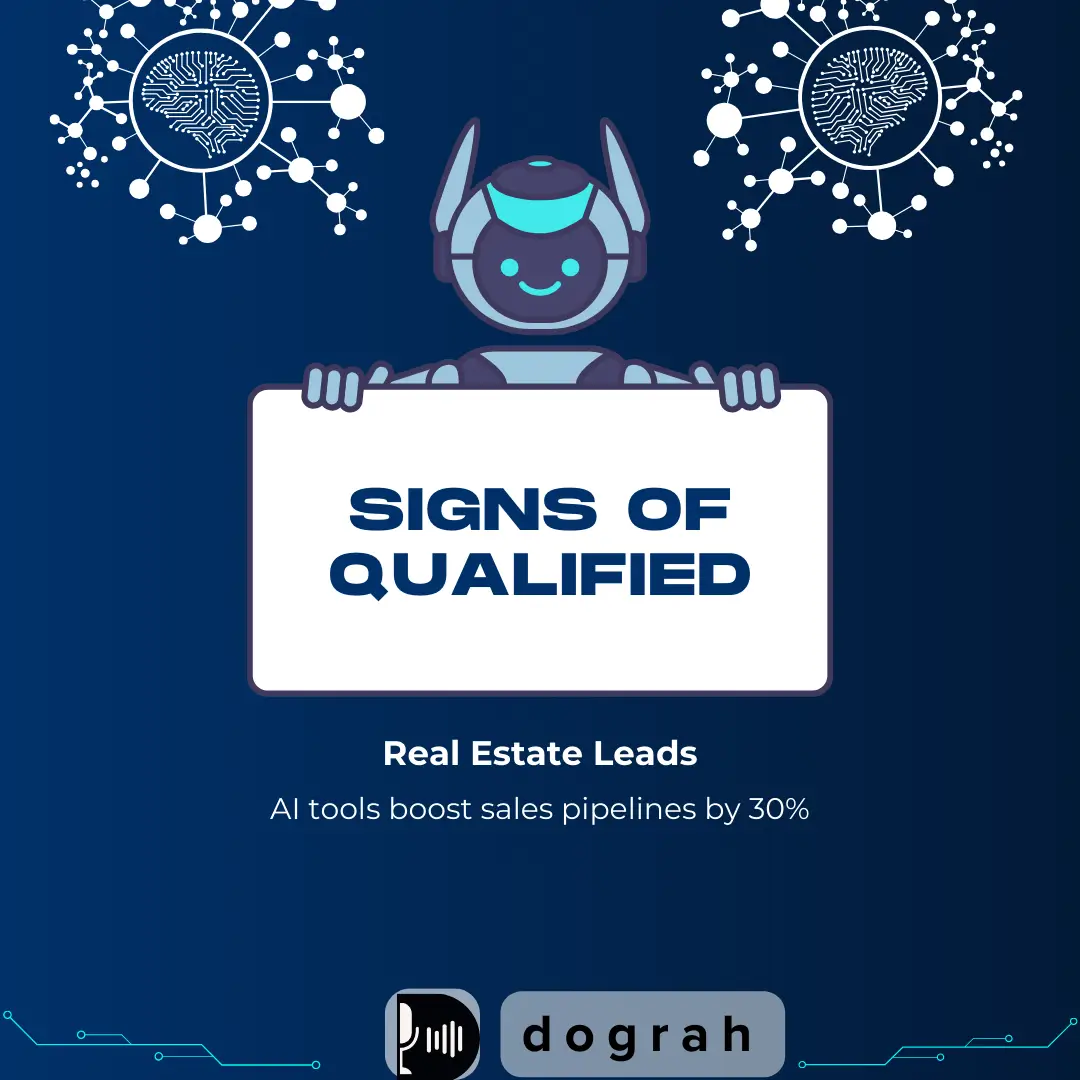
Real estate lead qualification remains a numbers game that agents find hard to win. A mere handful of prospects from 100 real estate leads end up generating revenue. This makes early identification of qualified prospects a vital factor to success.
Lead qualification boils down to determining which prospects deserve your time and resources. AI tools boost sales pipelines by 30% and increase conversions by 15% during the qualification process. Data shows that 80% of leads close after five touches, yet only 8% of salespeople reach out five times. This creates a great chance for agents who can spot promising leads and stay persistent.
This piece will uncover the hidden signs of qualified real estate leads. You'll learn a proven framework that helps distinguish serious prospects from casual browsers. These subtle indicators will help you focus your energy where it counts and boost your conversion rates.

Why Most Agents Miss the Signs of a Qualified Lead
Real estate agents miss valuable opportunities daily because they don't know how to spot qualified leads. I've seen many of my colleagues waste time chasing prospects who never buy while missing out on deals that could have closed quickly.
The difference between obvious and hidden signals
Real estate professionals often look only at obvious qualification signals—like when leads tell you their budget or timeline. These clear indicators matter, but they're just one part of the story. Hidden signals, though harder to spot, tell us more about what prospects really want.
Here's something interesting: rather than statements buying signals frequently come in the form of questions. A potential client who asks "What kind of warranties do you offer?" or "What is your build time?" shows real interest. But when they make statements like "That price is at least $10,000 over my budget," they're objecting. Compare that to a buying signal question: "Could you take another $10,000 off the price?".
Top agents read body language too. A prospect's smile at a specific feature or leaning forward during talks shows they're interested. These silent signals mean a lot, especially with careful buyers who don't want to seem too excited in case it hurts their negotiating power.
The SPIN technique gives us a framework to uncover these hidden signals:
- Situation questions (property overview)
- Problem questions (motivation for selling/buying)
- Implication questions (consequences of not moving forward)
- Need-payoff questions (benefits of working with you)
Letting prospects share their story naturally works better than running through a yes/no checklist. You'll learn things you might never have thought to ask about. This builds trust and rapport-key ingredients to turn leads into clients.

Why early qualification matters more than ever
Today's competitive market demands early qualification. The truth is, . You need to qualify leads right from the start out of 100 real estate leads, only a few will bring in money.
Poor qualification costs you dearly. An overloaded pipeline with unqualified prospects creates several issues:
- Agents burn out from spinning their wheels
- Lead follow-up quality suffers when the list grows too long
- Good leads go cold while you chase dead ends
Remember, time is a non-renewable resource for real estate agents. Every minute spent with unqualified leads takes away from potential buyers. This adds up fast when you handle hundreds of inquiries each week.
Early qualification stops you from falling into the "just reply and see what happens" trap. Without a solid system, agents react to leads instead of working strategically.
Numbers tell the story. Research shows organizations with solid lead qualification strategies see 72% higher conversion rates. Companies that stick to a standard lead qualification process also enjoy 38% higher sales win rates.
A lead qualification checklist matched to your market helps you spot promising leads based on their:
- Interest and engagement level
- Financial ability to purchase
- Decision-making authority
- Timeline for moving forward
- Specific needs that match your offerings
This quick assessment helps you use your resources better. You can focus on leads likely to convert while keeping in touch with future possibilities.
Understanding both clear and subtle signals from qualified leads helps you work smarter. Instead of chasing every lead, you'll spend time with prospects who have the drive, money, and power to make deals happen.

How to Reduce Speech Latency
Behavioral Clues That Reveal Buyer Readiness
Finding hidden signs of qualified real estate leads takes sharp observation skills and understanding of how people behave. My years in this industry have taught me that buyer readiness shows up in consistent behavior patterns-you just need to know the signs.
They ask specific, property-related questions
Serious buyers tend to ask questions that show they're already picturing themselves living there. Real estate professionals know that potential buyers who ask about are likely visualizing their future life in that property. These people aren't just browsing—they're already planning ahead local schools, community events, and neighborhood amenities.
You can tell a lot from the types of questions they ask. Window shoppers usually stick to simple, polite questions. In contrast, qualified leads ask detailed, property-specific questions that reveal genuine interest. Someone who asks about planning permission, structural details, or renovation possibilities is already thinking about making the property their own.
The research behind their questions tells an important story. People who've done their homework before viewing-asking about specific features from listings or mentioning neighborhood stats-show a level of commitment you won't see from casual browsers.
Buyers who bring their family members, especially children, to property viewings are usually serious. Real estate experts have found that parents who include their kids in viewings are more likely to make an offer.
They respond quickly and consistently
The way people communicate says more about their buying intentions than most agents think. Research shows that serious buyers keep up throughout their search. They're quick to respond, follow up after seeing properties, and show up for scheduled appointments prompt, consistent communication.
Multiple visits to the same property speak volumes about buyer interest. People who come back for second or third looks are sending strong signals. First visits give them the big picture, but return trips mean they're working through details and thinking about specifics.
Real engagement goes beyond answering calls. Qualified leads initiate communication proactively instead of waiting to hear from you. They send properties they like, request more information, and stay in regular contact during their search. Lead qualification experts have found that how quickly prospects respond relates directly to their interest level and intention to buy.
Their communication style evolves as they get more serious changing from general questions to specific next steps in the buying process. This move from "just looking" to "how do we proceed" shows someone becoming a serious buyer.
They show urgency without pressure
Real urgency looks different from desperation. It comes from actual life changes job moves, growing families, or sold properties that create natural buying timelines. These buyers don't need sales pressure because they have real reasons driving their schedule.
Motivated buyers often mention their search duration. Those who've looked at many properties usually reach a point where they'll adjust their priorities to find a home. Pay attention to people who say they've seen lots of properties without success they tend to make decisions faster.
The home-buying experience has clear readiness phases. Real estate coaching experts point to three main stages: Discovery (browsing), Identifying (creating specific criteria), and Commitment (ready to purchase immediately). Knowing where your prospect stands helps you adjust your approach.
Money talks when it comes to serious intent. Buyers who have their mortgage pre-approval or have sold their current home show they're financially ready and committed. These people know their budget and can act fast when they find the right place.
Spotting these behavior patterns helps you identify qualified leads early. This lets you focus your energy on prospects who are likely to buy instead of chasing casual inquiries that rarely turn into sales.
The Conversation Framework: How to Qualify Without Interrogating
Becoming skilled at qualification conversations sets top-producing agents apart from others. The best brokers know that real estate thrives on relationships where communication skills directly shape success. Your lead qualification must feel natural as you gather vital information through questions.
How to ask the right questions naturally
The right approach creates comfortable conversations rather than interrogations. Putting myself in my client's position helps me understand their needs better. The best agents ask themselves "If I were in their shoes, what would I do?" This mindset guides recommendations that serve the client's interests.
The gives us a solid framework for natural qualification SPIN technique:
- Situation questions: Start with open-ended questions about their property search or selling situation
- Problem questions: Uncover their motivation for buying/selling naturally
- Implication questions: Show them what happens if they don't move forward
- Need-payoff questions: Help them see how you can solve their challenges
This approach works best when you start with big-picture questions that let prospects tell their story. To cite an instance, see how "What brought you to this neighborhood?" works better than a list of yes/no questions. People share details you might never think to ask about.
Using to reveal intent open-ended questions
Open-ended questions tell you much more about a prospect's readiness than closed ones. These questions go beyond yes/no answers and often reveal motivations, timelines, and financial readiness.
Questions that work well with qualified leads include:
- "What's your plan B if you don't find what you're looking for?"
- "What are you looking for in a real estate agent?"
- "What parts of the buying/selling process are least clear to you?"
These questions reveal emotional drivers and hidden concerns, not just facts. Qualified leads usually give detailed, clear answers instead of vague statements.
Your qualification questions need perfect timing. Questions should flow from building rapport to qualifying, then probing and finally closing as leads move through your pipeline. Prospects find this natural while you qualify them step by step.
What happens after conversations matters just as much. My two-step process works well: I recap key points verbally, then email the same recap soon after we talk. Clients can fix anything I misunderstood, which builds trust and clarity.
Avoiding illegal or biased questions
Legal boundaries matter a lot when it comes to effective questioning. "Steering" happens when agents push buyers toward or away from neighborhoods based on protected characteristics like race, color, religion, gender, disability, familial status, or national origin.
Simple questions about whether a neighborhood is "good for families" or "safe" might break fair housing laws. The best approach points clients to objective third-party sources with neighborhood data instead of sharing personal opinions.
Clients often use words like "nice," "good," or "safe." You should respond with questions about specific criteria such as:
- Property features they want
- Price point needs
- Specific amenities they must have
The safest approach asks all clients the same standard questions. Keep your focus on things that directly relate to their tenancy, financial creditworthiness, or property care. This protects both your clients and your business.
Great agents know qualification builds relationships through meaningful conversations. These talks reveal needs and establish trust rather than feeling like interrogations.

Building Your Own Lead Qualification Checklist
A well-laid-out lead qualification system reshapes the scene of client management. You can identify, prioritize, and convert the most promising leads into clients instead of making educated guesses about which prospects deserve your attention.
What is lead qualification and why it matters
Lead qualification helps you gather information about leads to determine their willingness and financial ability to convert. This process lets you create a lead hierarchy that organizes prospects by priority and removes those who don't fit your criteria.
The numbers tell the story: to have a sales conversation. Without proper filtering, you might waste time on nearly three-quarters of your leads. Companies that use solid lead qualification strategies see 72% higher conversion rates compared to those that don't only 27% of leads are qualified.
The advantages go beyond just conversion. Qualifying your real estate leads helps you:
- Optimize your lead generation ROI
- Save resources by avoiding disinterested prospects
- Get better sales efficiency rates
- Build stronger customer satisfaction and retention
Creating a checklist based on your market
Your content and ads should target specific customer profiles. This profile becomes your ideal customer blueprint. Your market might need these specific characteristics:
Location, budget, timeline to sell, existing customers, competition, communication style, values and goals, and geographic priorities.
Pick a qualification framework that matches your business approach. BANT (Budget, Authority, Needs, Timing) suits straightforward transactions, while CHAMP starts by understanding challenges - perfect for warm leads. You might need detailed frameworks for complex deals with multiple decision-makers.
Your unique market conditions should shape your qualification process. Look into specific market challenges where your clients want to buy or sell. This knowledge helps you decide if a lead deserves your attention.
Sample questions to ask a lead
Strategic questions help qualify leads best. These questions should reveal motivation, timeline, financial readiness, and decision-making authority:
Financial qualification:
- "How much are you able to afford and willing to spend?"
- "Have you been pre-approved by a lender?"
Property-specific questions:
- "What type of property are you looking for?" (qualified leads give detailed information)
- "Do you live on the property you're selling?"
- "What's the condition of the property?"
Timeline and motivation:
- "When do you need to sell/buy the property?"
- "Why do you want to sell/buy?"
- "How long have you been looking?" (look for leads needing to purchase within 2-3 months)
Decision-making process:
- "Is there another decision-maker involved?"
Note that your tone should stay conversational rather than interrogative. Your qualification checklist guides you but isn't a rigid script. This approach helps you build relationships while finding your most promising prospects.
Getting started with Dograh
Interested in leveraging Dograh for lead generation, cold calling or business automation ? Here’s a streamlined path to getting started, along with direct links to essential resources :
1. Dograh AI: Quick Start Demo
2. Run Docker Command
Download and Start Dograh first startup may take 2-3 mins to download all images
3. Quick Start Instructions
How to Build AI Voice Agent - Step by Step with Dograh
Step by step written guide to building and deploying your first voice AI Agent
- Open Dashboard: Launch http://localhost:3000 on your browser.
- Choose Call Type: Select Inbound or Outbound calling.
- Name Your Bot: Use a short two-word name (e.g., Lead Qualification).
- Describe Use Case: In 5–10 words (e.g., Screen insurance form submissions for purchase intent).
- Launch: Your bot is ready! Open the bot and click Web Call to talk to it.
4. Community & Support
Join Slack Community and discuss issue with Dograh experts :
5. Additional Resource
Related Blog
- Discover the Top AI Communities to Join in 2025 for innovation and collaboration.
- Learn what makes Voice-Enabled AI Workflow Builders Effective in 2025.
- Discover how Making AI Outbound Calls Work: A Technical Guide for Call Centers can streamline automation and boost call efficiency.
- Explore AI Outbound Calling in 2025: What Actually Works Now to learn proven strategies for effective, real-world voice automation.
- See how 24/7 Virtual Receptionist Helps Small Firms Win More Clients by boosting responsiveness and improving customer engagement.
- Learn how How Call Automation Cuts Outbound Calling Costs by 60%: Virtual Assistant Guide can transform your call center’s efficiency and savings.
FAQ's
1. How can real estate agents identify qualified leads?
Qualified leads often exhibit specific behaviors like asking detailed property-related questions, responding quickly and consistently to communication, and showing genuine urgency without pressure. Agents should look for prospects who inquire about neighborhood specifics, maintain prompt follow-ups, and demonstrate financial readiness.
2. What are some effective lead qualification techniques for real estate professionals?
Successful lead qualification involves using frameworks like SPIN (Situation, Problem, Implication, Need-payoff) or BANT (Budget, Authority, Needs, Timing). Agents should ask open-ended questions, focus on understanding the prospect's motivations and timeline, and avoid interrogation-style conversations to build rapport naturally.
3. Why is early lead qualification important in real estate?
Early qualification helps agents focus their time and resources on prospects most likely to convert. It prevents sales burnout, improves follow-up quality, and ensures hot leads don't go cold. Organizations with effective lead qualification strategies experience significantly higher conversion rates and sales win rates.
4. What questions should be included in a real estate lead qualification checklist?
A comprehensive checklist should include questions about financial readiness (e.g., "Have you been pre-approved by a lender?"), property preferences, timeline for buying/selling, motivation, and decision-making process. It's important to tailor these questions to your specific market and maintain a conversational tone.
5. How can real estate agents qualify leads without violating fair housing laws?
To avoid potential fair housing violations, agents should stick to objective criteria and avoid questions that could be interpreted as steering. Instead of offering subjective opinions on neighborhoods, direct clients to third-party sources for area-specific information. Consistently ask all clients the same standard questions related to their property needs, finances, and timeline.
Was this article helpful?




